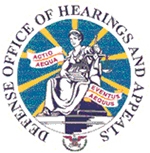The DOHA Hearing
Why DOD CAF Refers Cases to DOHA
After a Personnel Security Investigation (PSI) has been completed, a certified PSMO-I (Personnel Security Management Office-Industry) adjudicator of the DOD CAF reviews the Report of Investigation (ROI) and compares it to established qualifying criteria (13 Adjudicative Guidelines) for eligibility for access to classified national security information. The adjudicator also applies the following 9 Adjudicative Factors when evaluating an individual's conduct:
- The nature, extent and seriousness of the conduct
- The circumstances surrounding the conduct, to include knowledgeable participation
- The frequency and recency of the conduct
- The individual's age and maturity at the time of the conduct
- The extent to which participation is voluntary
- The presence or absence of rehabilitation and other permanent behavioral changes
- The motivation for the conduct
- The potential for pressure, coercion, exploitation, or duress; and
- The likelihood of continuation or recurrence of the conduct
Each case is judged on its own merits and the final determination is the responsibility of the specific department or agency that adjudicates the clearance eligibility. Any doubt regarding whether access to classified information is clearly consistent with national security must be resolved in favor of national security.
While the majority of applicants are granted a clearance, complicating factors may delay a decision or result in a denial or revocation of a security clearance. For industry, if the applicant's request is not clearly consistent with national security interests, the Department of Defense Consolidated Adjudications Facility (DoD CAF) forwards the case to the Defense Office of Hearings and Appeals (DOHA), in the Defense Legal Services Agency, to determine whether it is clearly consistent with the national interest to grant or continue a security clearance for the applicant. The ROI then goes to the DOHA adjudicators. If the DOHA adjudicators cannot make a decision, the case is then sent to an Administrative Judge (AJ) at DOHA. The DOHA hearing is not a criminal hearing. The DOHA hearing is not a civil hearing. The judge is not a real judge. The judge is an “Administrative Hearing Officer.” Title 18 U.S.C. Section 1001 applies, though.
The DOHA Hearing
- Opening arguments/statement - Government goes 1st, then applicant. No evidence introduced.
- Hear evidence from both sides - Introduce mitigators, call witnesses and submit sworn character reference letters.
- Closing arguments - Arguments for the judge to consider. No more evidence submitted or introduced
The judge makes his decision after reviewing the court manuscript. Applicant receives letter in 10-14 days. If denied or revoked, applicant has 15 days to submit an appeal.


Appealing a Security Clearance Denial/Revocation: Contractors
Defense Office of Hearings and Appeals
Step 1: The Statement of Reasons (SOR)
The Statement of Reasons tells the applicant the government’s exact concerns and allows the applicant an opportunity to respond in writing and hopefully mitigate those concerns. In some situations, the government will send the applicant a list of Interrogatories (questions) to answer prior to issuing a Statement of Reasons (SOR).
Step 2: The Administrative Hearing (DOHA AJ)
In-Person or written appeal to the DOHA Administrative Judge (AJ) In-Person Appeal highly advised!
DOHA
One Liberty Center
875 North Randolph Street 8TH Floor
Arlington, VA 22203 (Ballston Metro)
Step 3: The Appeal (DOHA Appeal Board)
In the event that the judge denies the applicant his or her clearance, the appeal is one final step the applicant can take. Unfortunately, there is a common misconception that an appeal is effectively an opportunity to re-litigate one’s case. It is not. Rather, an appeal is limited to challenging the judge’s decision based on technical grounds: for example, that the judge was mistaken in a point of law; that the judge exhibited improper bias against the applicant; that an item of evidence was erroneously admitted or not admitted into evidence; or, some other procedural irregularity of a similar nature.
The judge’s findings of fact are generally binding on the appeals board (just as they would be in a traditional court), hence the inability to re-argue the facts – and the importance of getting things right the first time.